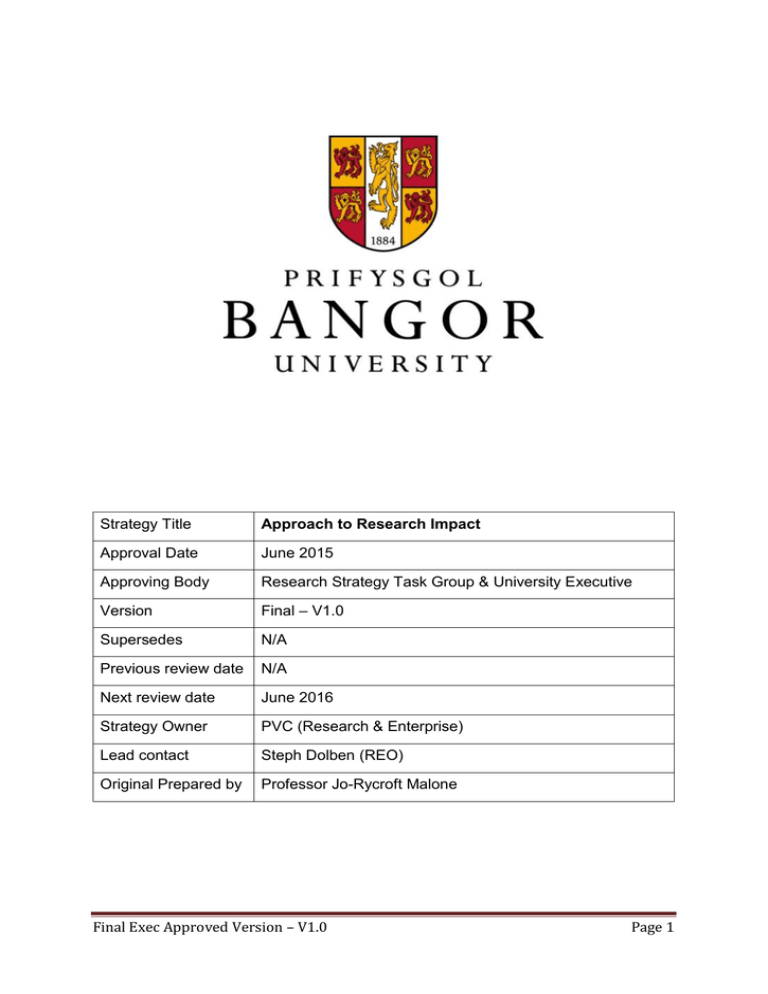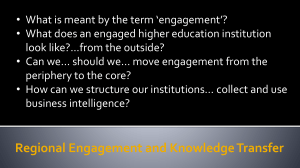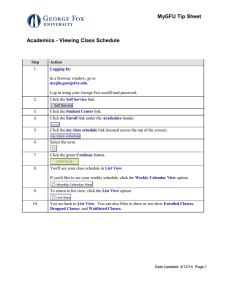Final Exec Approved Version – V1.0 Page 1 Strategy Title Approach
advertisement

Strategy Title Approach to Research Impact Approval Date June 2015 Approving Body Research Strategy Task Group & University Executive Version Final – V1.0 Supersedes N/A Previous review date N/A Next review date June 2016 Strategy Owner PVC (Research & Enterprise) Lead contact Steph Dolben (REO) Original Prepared by Professor Jo-Rycroft Malone Final Exec Approved Version – V1.0 Page 1 Bangor University’s Approach to Research Impact All research has the potential for impact within and beyond academia. Society, the government and funding bodies have been placing an increasing emphasis on how research can have a greater impact beyond academia. At Bangor University we aim to combine knowledge creation of international excellence with innovation and communication to ensure all areas of our research make economic, social and cultural advancements. Bangor University’s continued research funding and reputation rests heavily on our ability to demonstrate impact, and in addressing grand societal challenges. This document sets out a strategy and operational actions to ensure we maximise the impact of our research throughout the life cycle of the research process. Life cycle approach Our approach to impact needs to consider the whole life cycle of the research process from ideas generation, through delivery, post completion activity and beyond and (http://www.rcuk.ac.uk/innovation/impact/). Therefore we need to develop processes for embedding impact throughout this life cycle and for these to be straightforward, and not burdensome. Managing and co-ordinating impact across the University We need to increase our commitment to the impact agenda, including how we manage it across the University’s structures and services. Out approach to impact for REF2014 was retrospective and the process of gathering evidence challenging. It is likely that the focus on impact will remain, if not increase, in the next research process. Therefore we need to develop our systems and processes to allow us to pay attention to impact in real time and prospectively. In September 2013 the University’s Executive agreed the need to create a coherent crossuniversity approach to managing impact in the future. They also agreed that delivering enhanced impact will require resource allocation within schools, colleges and central services. »Action We will create a central Impact Strategy Task Group, which will report into the University Research Strategy Task Group. Colleges will take responsibility for coordinating impact within their constituent Schools by identifying an ‘Impact Champion’ who will become part of the central Impact Strategy Task Group, and supported by colleagues from relevant support services including the Research & Enterprise Office, and other relevant departments such as Corporate Communications & Marketing, Library & Archives Service and the Planning & Governance Office. The College ‘Impact Champion’ will work with their constituent Schools to ensure that impact is built into core activity and becomes of the planning process. Final Exec Approved Version – V1.0 Page 2 Schools need to pay attention to impact so that staff within them are able to see impact as relevant and important and so that they can feed effectively into college level processes, this might be achieved through a champion or lead model (e.g. as part of the role of deputy head for knowledge transfer/impact/enterprise). Impact will become part of an annual institutional review related to future research excellence assessments, i.e. the ‘rolling REF,’ a process that will be managed through REO and the College structure. Different types of impact It is important to acknowledge that research can have different types of impact, which are all relevant to the breadth of the University’s research portfolio [even if they are not all relevant to a REF definition of impact], including: Academic impact: the contribution that research makes to academic advances, across and within disciplines, including significant advances in understanding, methods, theory and application, e.g. as measured by citations. Economic impact: the contribution that research makes outside of the university on for example, society and the economy, through for example, commercialisation / exploitation, attracting R&D investment, wealth creation, economic prosperity and regeneration. Societal impact: the contribution that research makes outside of the University on for example, quality of life, creativity, culture, increasing the effectiveness of public services and policy. Capacity and capability building: through technical and personal skill development. These impacts can be more or less direct in that research may have a direct or instrumental impact on policy, practice, service provision, behaviour and legislation. Equally research may have impact in more conceptual ways, such as helping to reframe debates and in changing people’s thinking. »Action Taking account of the different types of impact that research within Bangor University could have it will be important to ensure they are provided with appropriate support, processes and systems for capturing and sharing impact. We therefore need to create tailored approaches and resources depending on the type of impact that is likely to be generated from the different disciplines and subjects across the University. This will be helped by taking a college champion approach – someone who is familiar with the research conducted in their college and who has an awareness of the different types of impact that could be nurtured and captured. Final Exec Approved Version – V1.0 Page 3 Raising the awareness of impact Whilst impact was a prominent part of REF2014, we still need to work on raising awareness about the importance and centrality of impact as a core activity. Not all academics will be contributing to REF impact case studies, but all have the potential to increase the impact of their research. However, we need to develop better resources and opportunities for academics to learn about impact, and about the support that is available to them within the University. We also need to work on the visibility of our research with impact activity. Currently the impact of our research has limited visibility both externally or internally. »Actions To complement the research communications strategy, a new website presence will be developed with a dedicated space for Impact. This space will act as both a marketing tool and a resource repository. To embed development and learning opportunities around the impact agenda in the Researcher Development Programme. To maximize the opportunities that the ESRC Impact Acceleration Account offers in relation to the development and delivery of events and workshops. To raise awareness of the systems, processes and support available to facilitate impact activity. To provide training and support for academics and administrators to engage with different types of communication, such as Twitter and the use of other social media, such as Blogs etc. The strategic planning of these activities will be led by the Impact Strategy Task Group but the responsibility for delivering these initiatives will be shared between REO, Colleges and Schools, Communications & Marketing, PONTIO and Human Resources. Capturing impact Impact needs to be built into the research support system so that as soon as a research idea is conceived, the potential impact should be considered. Any systems that are employed to capture research ideas must also capture their impact potential. Fledgling impact stories can then be elaborated upon as projects progress and that the reporting procedures to form an auditable source of impact data. »Actions Develop an institutional system to capture impact studies and stories, which can be both internally and externally facing. Final Exec Approved Version – V1.0 Page 4 Colleges and Schools determine locally how they will engage with the institutional system. Data collection and capture systems need to be aligned so that they are easy to use, and the information within them can feed into other processes (such as Bangor University Impact Awards, HEBCIS and rolling REF). Ensure that impact is included in project initiation forms and/or research applications/proposals. This action is particularly relevant for non-research council funding opportunities where the need to demonstrate pathways to impact may be less explicit in the application process. Develop a proforma/guide for academics to use both as a prompt to know what types of activities to engage in, to record the different types of impact generating activities they undertake and to gather any evidence of impact as projects progress. REO will take a lead role in developing a mechanism to capture and collate information within and across the University from grant impact statements, reports to funders, engagement activities, and from our commercialisation activities. This information will be used to develop a ‘Bangor Brand’ and as a source of information for learning. Increasing impact Giving informal advice to businesses, along with lectures, networking, contract work, student placements, joint publications and consultancy are the most widely undertaken activities that are likely to generate external impacts. Additionally intermediaries such as consultancies, think tanks, the media, and other organisational bodies aggregate, distil and re-package trends in academic research for clients and other actors in the private sector, government, and society. Being smart about working with intermediaries and networks can broaden access to the potential beneficiaries of research. Academics need to move beyond [simply] maintaining a CV and publications list to developing and updating an ‘impacts file’ that allows them to list occasions of influence in a recordable and auditable way. We need to learn from corporate customer relationship management (CRM) systems to better collect, collate, and analyse information gathered from different parts of the University and encourage academics to record their impact-related work with external actors. Citation is not the only measure of impact but it is an important and measurable factor. There are substantial differences in the general rate of citing across disciplines with more cites (including self-cites) being found in the sciences than the social sciences; also the type of output chosen affects citation rates e.g. on average a book will take longer to be referred to but will be cited for longer. There are several tools available to track citation rates and using a combination of the three most prominent tools, which are Harzing’s Publish or Perish, Google Scholar and Book Search, and the ISI Web of Knowledge. Final Exec Approved Version – V1.0 Page 5 »Actions We should encourage academics to engage with those bodies in government and elsewhere that are responsible for policy and strategic direction, to ensure that our voice and our research findings influence and guide them. We should encourage academics to develop their own impact portfolio, this should include recording ways they increase their ‘presence’ whether that be for example, through paying attention to increased citation methods or through engagement activities. REO need to develop processes and ways of working that join up commercialization and business facing activities with research related activities/the academic community. A better interface could increase our opportunities for impact and for improving external relationships with end users. We need to find ways to incentivise and support staff engagement in major consultations, public and private organisations and in the media (see section on performance review & promotions). Making knowledge available to all We have to ensure that the knowledge generated by our research is made available to potential users, including the general public, industry, government or agencies that implement policy informed by evidence. This means making all research outputs accessible. Academic work tends to be highly siloed into disciplines while societal problems are multidimensional. Bridging scholarship across disciplines, promoting integration at the University level and engaging in academic and professional service are some ways in which academics’ work can better reach and influence wider society. This again supports the creation and management of a co-ordinated approach to impact. We also have a duty to engage with the general public and to facilitate better understanding of our research. »Actions All outputs have to be stored in the University’s online institutional repository, which should be openly accessible. Academics should think about different formats for their outputs to ensure that readers beyond academia can gain easy access to their research. We should aim to reach wider audiences through public engagement activities and creative use of the media and by making full advantage of the potential of PONTIO. Final Exec Approved Version – V1.0 Page 6 We need to develop clearer roles for REO and marketing and communication in facilitating and showcasing impact. This will be facilitated by delivering on the ESRC Impact Acceleration Account but also by closer, more ‘joined up’ working. We need to effectively market our research strengths and clearly communicate our research achievements to relevant audiences, which includes developing an effective web presence highlighting how research is making an impact. We should continue to celebrate Bangor University’s impact successes through an annual award ceremony. This will also provide an additional mechanism for engagement with the community and our stakeholders. Working in partnership We need to encourage more academics and research support services to work in collaboration through the whole research cycle. Engaging fully with the end users in the research process will ensure more meaningful outcomes and identifiable impacts. Our collaborations with public services, business community, policy community and third sector will ensure we use our multi-disciplinary capability to focus efforts on the most important social and economic challenges and co-produce relevant solutions. »Actions We will develop PONTIO to be a shared resource to bridge between arts and sciences, the University and the local community, Bangor and the wider world. We will explicitly identify the relationships we wish to develop and manage and implement an effective contact management system that targets these. Commercialisation and enterprise We need to develop stronger and more effective support of knowledge transfer, the protection and exploitation of IP and the creation of new companies and enterprises. This approach needs to be embedded within the planning of schools and colleges. »Actions We should encourage the commercialisation of our research and related activities (e.g. training, consultancy, development or branding / copyrighting of ‘products’) and find new ways of increasing researchers’ awareness of commercialisation opportunities. Final Exec Approved Version – V1.0 Page 7 Building impact into performance review and promotions As the importance of impact is increasing we need to reflect this in the way staff are managed, rewarded and promoted. Finding ways to help academics engage with the agenda and see that impact is an important and legitimate part of their role will be critical to the success of the institution’s strategy and performance in future research excellence assessment exercises. »Actions We need to embed impact more explicitly into the PDR processes. This will require working with Heads of Schools and Deans of Colleges to ensure impact is seen as relevant and valued aspect of an academic’s career. We need to review and monitor promotion criteria and performance development processes to ensure that impact generation and knowledge transfer activities are appropriately recognised and rewarded. We need to share examples/cases of promotion that have been based on excellence of impact/knowledge transfer in order to demonstrate the validity of this route to promotion. Final Exec Approved Version – V1.0 Page 8

